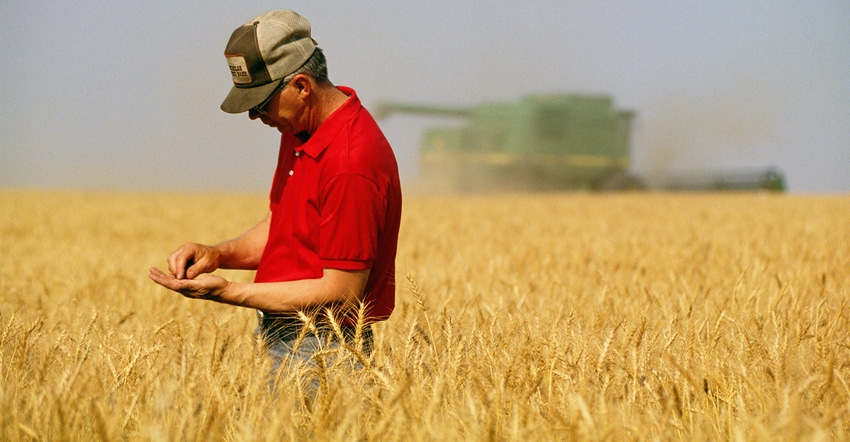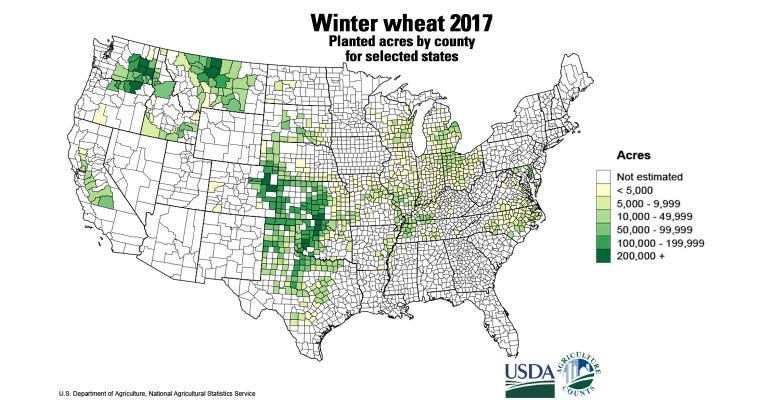
A group of Missouri wheat growers want to form a state association and possible checkoff program to fund research and provide a voice for soft red winter wheat growers.
Richard Arnett, secretary/treasurer of the Missouri Crop Improvement Association, is working with roughly 10 farmers to develop the Missouri Wheat Association. He is helping fill out the more than 24 pages of paperwork that outlines every detail of how the proposed organization will work, how it will be funded, who will comprise the board of directors and its overall mission.
“Wheat in Missouri is always an afterthought,” Arnett says. However, over the past 10 years, farmers have seen an increase in wheat yields. “Farmers are reaching 80-to 90-bushel average wheat yields on a regular basis,” he adds. At those levels, growing wheat makes economic sense.
Morgan County farmer Mel Gerber is a supporter of the idea. He is considered one of the early adopters of high yielding wheat management practices. Gerber says growers double cropping wheat after soybeans under irrigation are making nearly $1,000 per acre in terms of gross income. However, he admits wheat can be most profitable in less than optimum ground.
“If you are making less than 180-bushel corn crop on average,” he says, “you should be growing wheat.”
Sweet spot for soft
At one time, Missouri farmers grew quite a bit of wheat. In the 1920s it was a major crop for the state, hitting production highs of 4.5 million acres, according to Greg Luce, University of Missouri Extension grain crops specialist and research director for Missouri Soybean Association. Planted wheat acres fluctuated for roughly 50 years, jumping from 1 million acres up to 3 million. After the 1980s, crop plantings fell below 1 million. Today, Missouri hovers between 500,000 and 700,000 acres of wheat planted.
These acres are mainly soft red winter wheat. “Of all the states that raise soft red winter wheat,” Luce says, “Missouri is the top one.”
According to USDA, there are 26 states with soft red winter wheat production. Of those states, 10 already have a state checkoff. For the most part, Arnett says these funds are focused on hard red wheat, with much making its way to the National Association of Wheat Growers (NAWG). “Soft wheat typically gets kicked to the corner,” he says. “(Missouri’s) state association will focus on soft red wheat and put the state’s needs first. We are not looking to join with the national group.”
Arnett says farmers have made it clear they want dollars generated to stay in the state for research. “They want it invested in a way that brings money back to the farm,” he says.
Researching new heights
Gerber is one of the central Missouri farmers involved in developing the state association. He says Missouri already has a world-class research program that would benefit from a checkoff.
Anne McKendry, University of Missouri College of Agriculture, Food and Natural Resources associate professor of plant science professor, is a proven leader in developing genetic wheat lines that are resistant to disease. Since McKendry arrived at MU in 1987, she has released 12 different varieties to the Missouri and national wheat markets. Her specialty breeding lines are resistant to fusarium head blight — the number one market-robbing menace to wheat growers.
 WHERE’S THE WHEAT? Missouri ranks among the top 10 nationally for number of acres devoted to wheat production. But when it comes to soft red winter wheat, the state consistently ranks No. 1.
WHERE’S THE WHEAT? Missouri ranks among the top 10 nationally for number of acres devoted to wheat production. But when it comes to soft red winter wheat, the state consistently ranks No. 1.

“It is a matter of having wheat lines that allow producers to produce quality wheat consistently,” Gerber says. “We need research on high yielding wheat that is resistant to diseases.”
Farmers attending the MU Crop Management Conference asked Arnett how much he thought was needed to fund research. To collect $500,000 off 650,000 acres of wheat would be roughly 1.5 cents per bushel on a year like 2018 where production reached close to 34 million bushels.
“That is just a ballpark figure,” Arnett says. “It will be up to producers what they want to fund. However, we are going to make sure that 100% of the check stays in Missouri for now. If a future board decides to be a part of the national program, they will need to establish a second checkoff.”
Next step
Arnett says once the paperwork is complete, the group will take the proposal to the Missouri Department of Agriculture. They will ask the director to put a petition to wheat growers to determine if they want a state association. “There will be public hearings for farmers,” Arnett adds. If the department allows, the petition will be sent to growers. “If 5% or more say yes, we can officially start the process of forming the group,” he says. For the checkoff, there will be an additional request made to the state. “But first, we need to form the state association,” he adds.
The Missouri Crop Improvement Association will provide the administrative work until the group was able to support itself.
“We need an organization that joins us together,” Gerber says, “to make our voices heard and to have research we need to move the industry forward.”
About the Author(s)
You May Also Like






